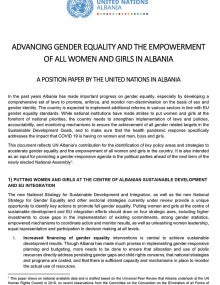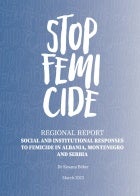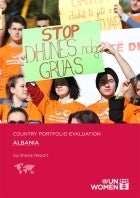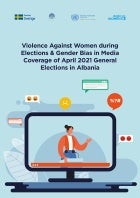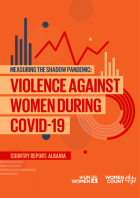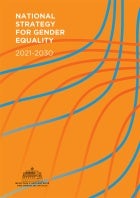1 - 20 of 33 Results
Pagination
Date:
Since the launch of UN Women’s strategic note for Albania (2022–2026), UN Women Albania has made significant strides in enhancing its reach and impact across the nation.
Date:
The regional report “Social and institutional responses to femicide in Albania, Montenegro and Serbia” was developed by FemPlatz with the technical support of UN Women in the framework of the regional programme on ending violence against women in the Western Balkans and Türkiye “Implementing Norms, Changing Minds,” funded by the European Union. The report – the result of three years’ work to develop a framework for understanding the characteristics, patterns, and causes of femicide – is the first interdisciplinary research on the societal and institutional response to femicide in Albania, Montenegro and Serbia.
Date:
This report presents the main findings, lessons learned, conclusions and recommendations of the Country Portfolio Evaluation of the UN Women Albania Country Office Strategic Note 2017– 2021, conducted between January and July 2021.
Date:
This publication describes UN Women Albania’s programme of work for the period 2022-2026. It highlights key areas of contribution of the Country Office across UN Women’s triple mandate of UN Coordination, normative support and operational activities.
Date:
A media monitoring study was conducted prior, during and after the general elections in Albania in 2021.
Date:
This publication compiles and analyses the results of Rapid Gender Assessment surveys on the impact of COVID-19 on violence against women (VAW RGAs) in Albania.
Date:
This comparative summary presents key data on public perceptions and attitudes towards violence against women and girls and gender stereotypes in Albania based on the findings of baseline, mid-term and end-line surveys. The summary was developed by the Observatory for Children and Youths Rights in Albania, within the UN Women regional programme on ending violence against women in the Western Balkans and Turkey “Implementing Norms, Changing Minds,” funded by the European Union.
Date:
“Women and Men in Albania” is published yearly by the Albanian Institute of Statistics (INSTAT) and displays data disaggregated by gender, aiming at the collection, analysis, and presentation of statistics by gender, and mirroring the social issues encountered on the cross-cutting policies monitoring, in the framework of achieving gender equality.
Date:
The National Strategy for Gender Equality 2021 – 2030 was developed on behalf of the Government of Albania by the Ministry
of Health and Social Protection, in coordination and consultation with other
responsible ministries, local self-governance units, independent institutions, civil
society organizations, academia, as well as international organizations that work
towards gender equality and ending gender-based violence and domestic violence
in Albania.
Date:
A joint position paper by United Nations in Albania identifying four key areas and strategies to accelerate gender equality and the empowerment of all women and girls in the country.
Date:
The purpose of this study is to draft an analytical report, which can contribute to improving and raising the effectiveness of the Albanian legislation in addressing violence against women in elections (VAWE), as well as strengthening protection provided during the implementation of such legislation.
Date:
This alternative Report was prepared by the Office of the Ombudsperson of Albania for the presentation before the United Nations Committee on the Elimination of All Forms of Discrimination against Women (CEDAW). It is focused on the monitoring of CEDAW Convention implementation by the Albanian State for the 2016-2020 period.
Date:
The report offers a concise, data-driven look at the implementation of the Beijing Platform for Action and issues a clarion call for stepping up progress to realize the promises of Beijing. It covers countries from the United Nations Economic Commission for Europe region and it is based on available data and information in the regional and global databases.
Date:
“Women and Men in Albania” is an annual publication, which presents data on different areas of life divided by gender, in order to reflect the problems of society in terms of achieving gender equality.
Date:
Access to information and services is one of the many priorities raised by women and girls during meetings in the municipalities of Tirana, Durres, Lezha, Elbasan, Debar and Lushnja.
Date:
Women and girls’ roles in their homes and communities – such as domestic and unpaid care responsibilities and as frontline health and social sector responder roles – increase their exposure to COVID-19.
Date:
The report on “The impact of the COVID-19 pandemic on specialist services for victims and survivors of violence in the Western Balkans and Turkey: A proposal for addressing the needs” is a rapid assessment of specialist services to women who experienced violence to better understand the challenges posed to service delivery, as well as to explore new opportunities for innovative approaches in light of the COVID-19 pandemic. The rapid assessment was undertaken within the EU-UN Women Regional Programme “Implementing Norms, Changing Minds.”
Date:
The purpose of this study is to draft an analytical report, which can contribute to improving and raising the effectiveness of the Albanian legislation in addressing violence against women in elections (VAWE), as well as strengthening protection provided during the implementation of such legislation.
Date:
To bring women’s views and solutions to the forefront of discussions and decisions on COVID-19 response, UN Women initiated rapid consultations with women’s organizations across the Europe and Central Asia region. The consultations provided an opportunity to hear directly about the specific risks and challenges that women and girls face as a result of the COVID-19 pandemic; they also focused on the opportunities and solutions they are providing so that the strategic focus of support can be adjusted in a gender-responsive manner to reflect their differentiated experience.
Date:
This dedicated protocol guides the operation of public and nonpublic residential centers providing shelter services to victims of domestic violence and human trafficking in Albania during the COVID-19 pandemic.
